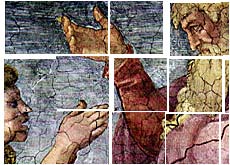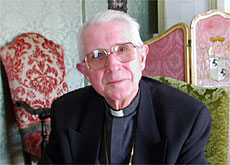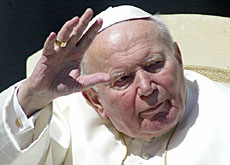Non-believers divided over Pope’s visit

Swiss agnostics and atheists have given a mixed welcome to the visit of Pope John Paul II to Switzerland this weekend.
While some are happy for the visit to go ahead, others are opposed, and have pointed to the high costs involved in ensuring the Pontiff’s safety.
Swiss-French writer Etienne Barilier is one of more than 770,000 Swiss – or 11 per cent of the population – who declare no religious affiliation.
But he told swissinfo he could see positive aspects to the papal visit on June 5 and 6.
“In itself, this visit doesn’t pose a problem to non-believers,” Barilier told swissinfo.
“The Pope is one of the major figures of our time. It is not necessary to be Catholic to recognize him and to see that, just by virtue of who he is, this is an historical visit for our country.”
“Get Up!”
Young Swiss Catholics invited the Pope to visit Bern to attend the first national youth event in the history of the Swiss Catholic Church. The gathering has as its theme Jesus’s command quoted in the Gospel of Saint Luke to “Get Up!”.
“For me this means young people, full of life, calling on an old man in poor health to encourage them and to urge them on,” Barilier said. “Perhaps they are not wrong in this”.
But Barilier’s acceptance of the visit is not shared by all.
Enrico Riboni, an engineer and confirmed atheist, calls the slogan “a joke”.
“The history of the Catholic Church shows that it has never aimed to lift people up. It has always sought to impose itself on people, to make them kneel.”
Riboni, who runs a website called christianisme.ch, resents the fact that the city and canton of Bern will have to provide security for the event.
“He [the Pope] has a perfect right to go where he wants, but it shocks me that the Swiss people must pay [security] costs for the visit of a dictator.”
“The Vatican is, to my knowledge, the only western European state which does not allow freedom of the press.”
Ignoring the research
Like Riboni, Reta Caspar has doubts about the theme of the Catholic youth gathering. “Can they really ‘rise up’? Can they really say what they feel?”
A member of the central committee of the Swiss freethinkers’ association, Caspar says the youth gathering may be intended to give an air of vitality to an obsolete institution.
She and Riboni say the Church is failing its own people by not responding to calls for change even when they come from within. They say it ignores the findings of historians and scientists alike.
And they point to the famous Turin Shroud, in which Jesus Christ is said to have been wrapped in the tomb.
In 1988, the shroud was carbon-dated to the 13th or 14th century, yet it remains a sacred object for many Catholics.
“The Catholic Church is so irrational that it must remain as it is. If it starts to open up, it will collapse,” Caspar says with a laugh.
Power and money
All three say that while the media pay little attention to the views of agnostics, religion will always receive coverage.
“Non-believers have no message to interest the media, because a message is one step closer to dogma,” says Caspar.
Says Riboni: “There is a power base and money on the side of the churches. If you attack the Catholic Church, it’s like attacking Coke or Microsoft!”
“People like stories,” he says. “They go down better with the public than facts.”
Barilier says that while the media are careful not to offend religious sensibilities, they show no concern for the views of atheists.
“Personally, I find religious attitudes offensive and inappropriate when they scorn human dignity and reason,” he says.
“In the 19th and even the 20th centuries we had too much faith that humanity was on course towards autonomy and the age of reason,” he adds. “We were too hasty. It’s now time we said to ourselves ‘Get up!”.
swissinfo, Bernard Léchot
According to the Swiss Federal Statistics Office:
11% of Swiss have no religious affiliation.
42% are Catholic.
35.2% are Protestant.
4.3% are Muslim.
1.8% are Orthodox.
0.2% are Jews.

In compliance with the JTI standards
More: SWI swissinfo.ch certified by the Journalism Trust Initiative


You can find an overview of ongoing debates with our journalists here. Please join us!
If you want to start a conversation about a topic raised in this article or want to report factual errors, email us at english@swissinfo.ch.